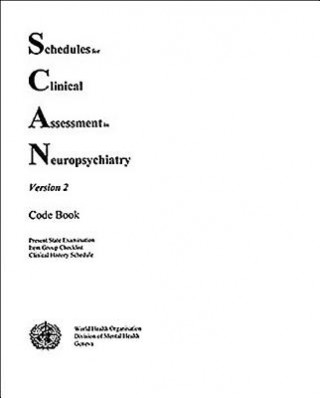
Kód: 04175327
Schedules for Clinical Assessment in Neuropsychiatry (SCAN)
Autor World Health Organization
SCAN - Schedules for Clinical Assessment in Neuropsychiatry - is a set of instruments aimed at assessing and classifying psychopathology in adults. Developed in the framework of WHO and the US ADAMHA Joint Project on Diagnosis and ... celý popis
- Jazyk:
 Angličtina
Angličtina - Vazba: Brožovaná
- Počet stran: 277
Nakladatelství: American Psychiatric Association Publishing, 1994
- Více informací o knize

Mohlo by se vám také líbit
-

Dune
249 Kč -

Haunting Adeline
621 Kč -

Berserk Deluxe Volume 2
1092 Kč -

White Nights
71 Kč -

Powerless
268 Kč -

Atomic Habits
330 Kč -

Dune Messiah
228 Kč -

Berserk Deluxe Volume 3
1142 Kč -

One Day
221 Kč -

Berserk Deluxe Volume 1
1115 Kč -

Iron Flame
368 Kč -

Surrounded by Idiots
213 Kč -

Harry Potter and the Prisoner of Azkaban (Minalima Edition)
993 Kč -

Gravity Falls Journal 3
441 Kč -

Heaven Official's Blessing: Tian Guan Ci Fu (Novel) Vol. 1
443 Kč -

The Creative Act
568 Kč -

Dune
276 Kč -

Hunting Adeline
624 Kč -

A Little Life
268 Kč -

Children of Dune
230 Kč -

Heaven Official's Blessing: Tian Guan Ci Fu (Novel) Vol. 2
427 Kč
Informovat o naskladnění knihy
Zadejte do formuláře e-mailovou adresu a jakmile knihu naskladníme, zašleme vám o tom zprávu. Pohlídáme vše za vás.
Více informací o knize Schedules for Clinical Assessment in Neuropsychiatry (SCAN)
 Anotace knihy
Anotace knihy
SCAN - Schedules for Clinical Assessment in Neuropsychiatry - is a set of instruments aimed at assessing and classifying psychopathology in adults. Developed in the framework of WHO and the US ADAMHA Joint Project on Diagnosis and Classification of Mental Disorders, Alcohol and Drug Related Problems, SCAN is a set of instruments aimed at assessing, measuring and classifying the psychopathology and behaviour associated with the major psychiatric disorders of adult life. The assessment is based on clinical cross-examination of the presence of specifically pre-defined symptoms of psychiatric disorders. It can be used for clinical, research and educational purposes. SCAN has four major components: PSE-10, the 10th edition of the Present State Examination; the SCAN glossary; the Item Group Checklist (IGC); and the Clinical History Schedule (CHS). The PSE, IGC and CHS are included in the manual. The Glossary is sold separately. In the PSE-10, Interview Schedules are used to record the respondent's experience against predefined item concepts. Items cover subchapters in ICD-10 and DSM-IV. PSE-10 itself has two parts. Part I covers somatoform, dissociative, anxiety, depressive and bipolar disorders and problems associated with appetite and alcohol and other substance use (14 sections covering F1, F3, F4 and F5). A screen for Part II conditions is also included. Part II covers psychotic and cognitive disorders and observed abnormalities of speech, affect and behaviour. The SCAN Glossary is the most important component of SCAN, because it is the basis for comparison that must be learned and carried in the interviewer's mind during the examination. The interviewer matches what the respondent says or does against the Glossary definitions. The Glossary is a comprehensive dictionary of differential definitions of clinical phenomena. Each SCAN item contains a brief definition, differential definitions of clinical concepts, a list of suggestions for probes that will elicit relevant information from the respondent, and rating instructions. The Glossary definition is more detailed and provides reasons for excluding other definitions. All those who use SCAN should know and must be able to apply these definitions. Extensive experience has demonstrated that it is possible for virtually every clinician to apply the definitions, even if they would not themselves agree with some of them. With regard to the Item Group Checklist (IGC), PSE-10 items are collated into groups that can be rated directly. This provides a simple means of using information from case records or informants other than the respondent, in particular for previous episodes of a disorder. The IGC is a useful supplement to PSE information and can also substitute in situations where the PSE cannot be used. It covers only the on-specific, anxiety, affective and psychotic symptom groups (F@-F4 only) and includes no ratings of cause or course. The IGC is constructed on the same principles as the Syndrome Check List PSE9. The Clinical History Schedule (CHS) includes a summary of clinical (F6-F9 disorders) and social history, and disability. The CHS provides an opportunity to check or enter data relevant to the presence or absence of disorders not otherwise covered in SCAN, including disorders with an origin specific to childhood or intellectual level, developmental disorders, social roles and performance, disability, personality disorders, and clinical diagnosis. Ratings of categories in ICD-10 subchapters F6-F9 are included. With regard to recording methods, the ratings can be made on the SCAN schedules. However, this would be expensive. This Code Book has been developed with a fixed format with item names and numbers. The PSE, IGC and CHS are included in the Manual.
 Parametry knihy
Parametry knihy
Zařazení knihy Knihy v angličtině Mathematics & science Biology, life sciences Life sciences: general issues
- Plný název: Schedules for Clinical Assessment in Neuropsychiatry (SCAN)
- Autor: World Health Organization
- Jazyk:
 Angličtina
Angličtina - Vazba: Brožovaná
- Počet stran: 277
- EAN: 9780880489850
- ISBN: 0880489855
- ID: 04175327
- Nakladatelství: American Psychiatric Association Publishing
- Hmotnost: 1618 g
- Rozměry: 228 × 170 × 57 mm
- Datum vydání: 31. October 1994
Osobní odběr Praha, Brno a 12903 dalších
Copyright ©2008-24 nejlevnejsi-knihy.cz Všechna práva vyhrazenaSoukromíCookies



 Vrácení do měsíce
Vrácení do měsíce 571 999 099 (8-15.30h)
571 999 099 (8-15.30h)